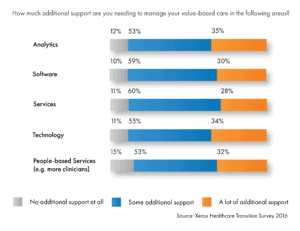No shortage of Fast Healthcare Interoperability Resources (FHIR) exist online, so we’re not going to rehash those helpful guides. Rather we’re going to tell the bigger story of FHIR’s rollout, barriers to adoption, collaboration among key players, and the current state of FHIR in the healthcare industry.
Our team understands the intricacies of a FHIR implementation—but don’t let the complexity intimidate you. The story of FHIR shows that collaboration within the industry creates a path for data interoperability that ultimately moves us all toward a shared goal of providing an optimal patient experience.
Table of Contents
What Is FHIR: Fast Healthcare Interoperability Resources
FHIR is a standard of programming electronic resources within healthcare software to enable data sharing, regardless of the solution or vendor. The goal of FHIR is to eliminate communication silos and promote data interoperability for a better healthcare experience.
The healthcare industry is ready for widespread adoption of FHIR because of refined standards, collaboration among vendors, and the business benefits of implementation.
Important Definitions for Discussing FHIR
This terminology is helpful for understanding the full picture of FHIR.
- Fast Healthcare Interoperability Resources (FHIR) – standardized protocol for programming healthcare IT systems to allow for data interoperability
- Data Interoperability – shared expectations for the exchange of information among systems
- Health Level 7 (HL7) – a nonprofit organization dedicated to developing standards for data interoperability, and the founding group of FHIR
- Application Programming Interface (API) – software that allows applications to access features or data of another operating system or application
A Brief History of FHIR Versions
FHIR resources have steadily evolved since their introduction in 2014. Updates are based on industry feedback for enhanced clarity and technical corrections. HL7 lists four releases as major historical milestones:

The latest FHIR update offered a normative base for IT developers to work from, allowing the implementation of FHIR consistently and uniformly. It spurred a resurgence of key industry players in healthcare and technology restating their commitment to FHIR implementation and long-term data interoperability. For a full history of changes, visit HL7’s version history.
Final Rules Push FHIR from Recommended to Required
The Centers for Medicare and Medicaid Services (CMS) and the Office of the National Coordinator of Health Information Technology (ONC) released the final rules for interoperability and information blocking with regards to HL7 FHIR on March 9, 2020. The rules aim to restrict payers and health systems from information blocking, which ultimately slows down interoperability.
This will affect how payers, providers, and patients exchange health data going forward. Payers must now provide access to patient data through an application programming interface (API) using FHIR and allow access to a list of in-network providers. The final rules from CMS and ONC push FHIR from a recommended standard protocol to required for interoperability, with potential penalties for non-compliance yet to be defined.
Sporadic Adoption of FHIR from the Start
While the intention of easy data sharing is a goal nearly everyone can get behind, the road to making that a reality has been rocky at best.
Data from a 2018 survey show approximately 32% of certified health IT vendors are using FHIR, primarily the 2015 version. However, 32% accounts for an estimated market share of 82% of hospitals and 64% of clinicians who are using certified products from these developers. (Note: Version 4 was released in 2018, two months after the survey.)
Putting these top 10 vendors who represent the aforementioned 32% aside, reports show concrete reasons for slow adoption centered around a gap in technical expertise.
Tamara StClaire, Chief Innovation Officer of Commercial Healthcare for Xerox stated in HealthITAnalytics.com:
“The new philosophy is about leveling up what your EHR does. With some of the new initiatives coming into play, like value-based care and patient engagement, we’re going to have to move to the next level. But people don’t really know how they can tackle this. In a recent survey, we asked them where they need help. Is it with technology? Analytics? Services? Across the board, they just said ‘yes.’”

So how can we move past these technology hurdles?
Vendors play an important consulting role when helping providers implement FHIR. Vendors are responsible for staying up to date with the latest protocol and encouraging their customers to push their boundaries in implementing new standards.
When it comes to FHIR, everything Smart Data Solutions does is through the lens of our shared goals for data interoperability and an optimal patient experience.
Collaboration Is At The Forefront of FHIR’s Future
With FHIR resources well-defined, the final rules for implementation in place, and trained vendor support to help overcome IT implementation, the last piece of kindling that will set FHIR ablaze (sorry, we had to) is collaboration.
Health IT Outcomes outlines three key players that need to collaborate in order for FHIR to have widespread success: vendors, developers, and providers.
- Vendors: Collaboration among vendors leads to consistent data exchange across platforms and potentially a single API for universal use.
- Developers: Developers are at the mercy of providers and vendors deciding FHIR is a requirement as well as providing the expertise for technical implementation.
- Providers: If providers demand FHIR, vendors and developers will make it happen. To get here, providers must realize the tangible benefits of making patient data easily exchangeable.
FHIR not only aids data exchange for important healthcare decisions but also promotes better business practices with instant information. As we continue to see FHIR adoption increase, the barrier to entry will make IT systems more manageable for healthcare companies of all sizes.
At Smart Data Solutions, our in-house technical experts are trained in FHIR protocol to help your practice meet any standard it requires. We take the intimidation out of FHIR-based systems from 20+ years of working with healthcare technology systems and the people behind them.
Get started by contacting SDS to discuss your business needs and how FHIR can help meet them.
